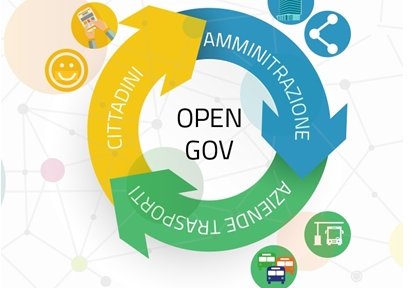Sardinia Region involved all the mobility stakeholders in participating in the “federated network of collective transport open data” and all the data concerning scheduled services were published: buses, trains, ferries, airplanes. Various info-mobility services were developed by ICT enterprises. A web application was developed to allow users to notify transport inefficiencies to agencies and public administration, which are now interconnected with users in order to improve public service quality.
Innovation Summary
Innovation Overview
Air and maritime accessibility and integration with land transport network are, for the islands, key aspects to guarantee territorial continuity and cohesion with the European Union. In addition, collective transport and intermodality are the most effective solutions for reducing the environmental impacts caused by vehicles emissions.
People and goods mobility is strictly related to information availability. The more information is available and usable, the lower the impediments people and goods experience before and during the journey. The more information is shared by the whole community, the more the community can participate in improving the system.
In Sardinia region public transport counts 16,000 trips paid with over 200.000.000 euros of public fees. Service monitoring is therefore difficult in a capillary manner. Users are distributed throughout the whole network and can offer, in their own interest, an important contribution reporting the discrepancies.
Federated network of collective transport open data
The Open Data paradigm (standardization, accessibility, availability, machine readable, no restrictions for reuse) well fit to the need to maximize the use, reuse and dissemination of mobility information. If those who produce the data (transport authorities and agencies) publish them in open data and keep them updated, they can guarantee quality of data, avoiding the diffusion of incorrect data and information. The Reg. Del. 1926/2017 goes in the same direction.
Sardinia Region involved all the mobility stakeholders in participating to the "federated network of collective transport open data"
The interoperability standards were shared, and the static data of all the scheduled services were published: Bus, Trains, Ferries, Airplanes. After only 2 months, various info-mobility services were developed by ICT enterprises.
Improving service quality by civic engagement
Transparency obtained by open data polices stimulated civic participation. Sardinia region tested a web application that allows users to notify discrepancies, in the same moment, to transport authority and agencies. Therefore, the Regional Department for Transport and agencies are now requested to solve the problems faced by users. Two semi-annual reports are published to highlight the activities implemented to address the critical issues raised by users.
Objectives
1) To increase accessibility and intermodality
Development gap caused by insularity is strictly related to accessibility. People and goods need to rely on modal transfer with effective information and reliable sources
2) To enhance transport services integration
Transport authorities and agencies need to share information for integrated services
3) To Customize info-mobility services for people and goods
People and goods need customized information services for agile mobility
4) To improve public service quality by civic engagement
Users can collaborate with transport authorities to identify and report the disruptions and inefficiencies to be corrected.
Achieved results
1) Creation of the open data federated network Scheduled services data standardization and interoperability for all transport modes. Increased data accessibility, quality, interoperability.
(http://www.sardegnamobilita.it/opengovernment/opendata/)
2) New customized info-mobility services for people and goods with no cost for public administration
(http://www.sardegnamobilita.it/index.php?xsl=2537&s=33&v=9&c=14458&es=6603&na=1&esp=1)
3) Development of a new web application for transport users claims
(http://www.sardegnamobilita.it/disservizi/)
4) 1000 Claims sent to transport authority and agencies - 4 Claims reports published - Improved collective transport monitoring and quality with no cost (http://www.sardegnamobilita.it/index.php?xsl=1033&s=348357&v=2&c=6761&t=1&na=1)
Innovation Description
What Makes Your Project Innovative?
Open data become the new infomobility paradigm.
The way to :
- maximize public transport information dissemination
- improve intermodality and connections
- improve public transport accessibility
- stimulate civic engagement in monitoring transport quality
People now have a tool to communicate both transport authorities and agencies their needs.
Transport authorities and agencies can't now hide service quality disruptions.
Innovation Development
Collaborations & Partnerships
Autonomous Region of Sardinia involved 60 transport agencies, 4 maritime companies, 3 airports to define open data standards.
ICT enterprises are now in collaboration with regional administration in order to monitor quality and updating of scheduled services open data in order to maximize the social and economic value of transport data.
User organisations were involved to test the web application, in order to optimize usability.
Users, Stakeholders & Beneficiaries
All transport agencies, maritime companies and airports take benefits from transport open data because they need to integrate their services and nodes.
ICT enterprises give infomobility services with data quality, increasing the use of applications by users.
Transport users can have a direct contact with transport authorities and agencies in order to improve transport service quality.
Also, they have more quality and availability of transport information.
Innovation Reflections
Results, Outcomes & Impacts
1) Creation of the open data federated network. Scheduled services data standardization and interoperability for all transport modes. Increased data accessibility, quality, interoperability.
(http://www.sardegnamobilita.it/opengovernment/opendata/)
2) New customized info-mobility services for people and goods with no cost for public administration
(http://www.sardegnamobilita.it/index.php?xsl=2537&s=33&v=9&c=14458&es=6603&na=1&esp=1)
3) Development of a new web application for transport users claims
(http://www.sardegnamobilita.it/disservizi/)
4) 1000 Claims sent to transport authority and agencies - 4 Claims reports published - Improved collective transport monitoring and quality with no cost (http://www.sardegnamobilita.it/index.php?xsl=1033&s=348357&v=2&c=6761&t=1&na=1)
Challenges and Failures
Cooperation was the most important challenge. Building relationships and persuasion on cooperation benefits.
Conditions for Success
Creativity, political endorsement, leadership, personal values and motivation.
Replication
This model can be replicated in all cities and regions. Transportation systems has more or less the same governance and stakeholders.
Lessons Learned
People and enterprises are ready to collaborate with public administration in order to reduce public costs and improve public service quality.
Anything Else?
I'm really proud taking part of increasing collective value.
Project Pitch
Supporting Videos
Date Published:
20 March 2017

